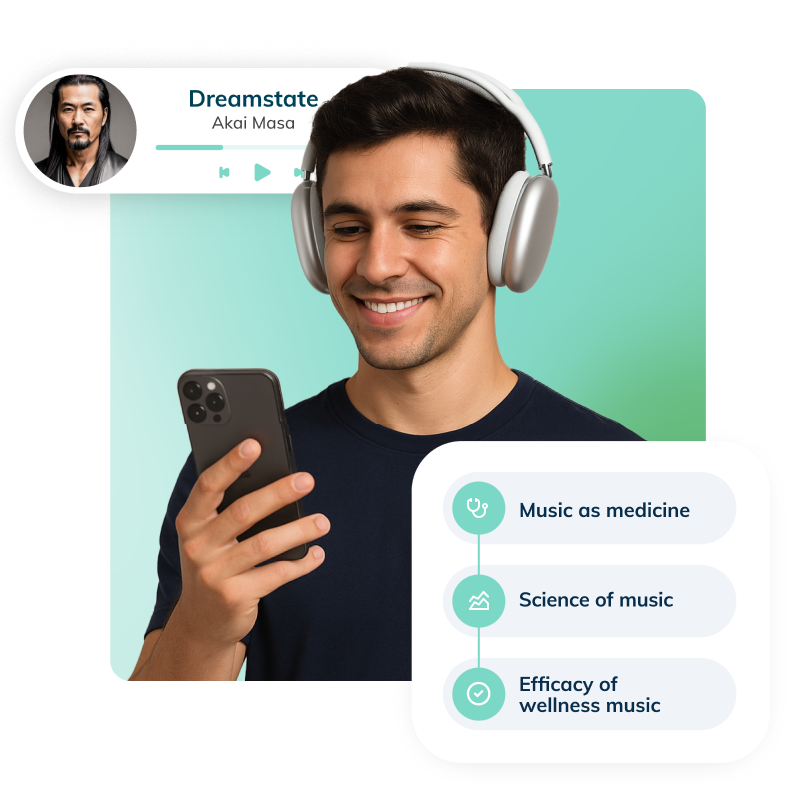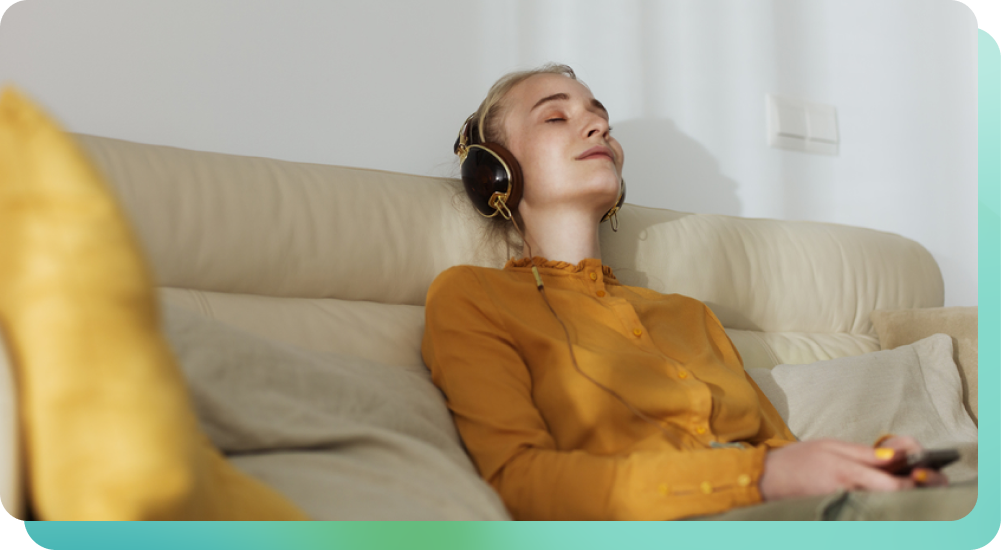Give your clients a personalized wellness music experience.
How music for wellness is transforming health-focused businesses
Music for wellness is a powerful tool for stress reduction, relaxation, sleep facilitation, and drug-free pain management. New research provides evidence for the healing power of music as medicine. Apps for relaxation and sleep, digital health, telehealth, focus music websites, and other wellness apps have limitless opportunities to enhance users’ experiences—and even improve their health—through the implementation of specific types of music for wellness.

The science behind wellness music
People all around the world intuitively acknowledge the power of music to influence our wellbeing—we choose certain music to energize us, to calm us down, or to cheer us up. Many cultures have a long history of using music to heal, and now there is new research emerging around the positive impact of music for wellness and healing.
As noted in the New York Times article, “When Music is the Best Medicine,” by Susan Gubar, music therapy is already being effectively used in numerous ways with patients suffering from anxiety, insomnia, depression, cancer, and dementia. [1] As neuroscience and brain research accelerates, there is a growing understanding of music’s impact on the brain, as well as a greater recognition of the vast but largely untapped potential in the use of sound as a healing modality.
The National Institutes for Health has joined with the John F. Kennedy Center for the Performing Arts and the National Endowment for the Arts on an initiative called Sound Health, with the goal of exploring and researching the interaction of music with the brain and the use of music as medicine. [2]
As awareness of music’s healing potential grows, industry leaders are already applying this science to real-world wellness solutions.
Why it works
The effects of music on the brain aren’t just anecdotal. They’re measurable. Feed.fm’s science-backed curation draws on neuroscience and biomusicology to deliver real wellness outcomes through functional music. Here’s how:
- Rhythm fuels motivation. Carefully selected tempos can energize the body or calm the nervous system, depending on the desired effect.
- Tones mimic the human voice. Soothing melodic contours and harmonic structures influence emotional states, promoting relaxation or focus.
- Music builds connection. Even when alone, music can create a sense of community and emotional resonance, improving mood and emotional wellbeing.
- It activates the reward system. Music stimulates the brain’s reward centers, reducing stress hormones, improving mood, and supporting cognitive performance.

With this scientific foundation, Feed.fm’s curated music isn’t just pleasant to hear—it’s purpose-built to deliver results.
Explore our Wellness Soundtracks or dive into the Feed Originals catalog for science-backed music, ready to stream.

Sleep music
Whether it’s calming music for sleep apps or meditation sleep music that you are looking for, we’ve found the best sleep music blends glacial synth-generated soundscapes, soft acoustic pieces, nature sounds, and Eastern influences under the broader umbrella of “relaxing ambient.”
Effective sleep music helps lower your level of arousal and activation, gradually taking you into a state of relaxation before fading away into ambient sounds that help mask environmental noise.
There is building evidence that using music for wellness can improve sleep quality, possibly through reducing sleep-onset latency, total sleep time, and efficiency. A 2022 meta-analysis of 13 and included 1007 participants found an increase in sleep quality after participants listened to prerecorded music daily, for 25 to 60 minutes. The studies provide evidence that sleep music may reduce problems with sleep-onset latency, total sleep time, and sleep efficiency. [3]
Feed.fm’s Wellness Soundtracks include curated sleep stations built around these principles, helping digital health platforms deliver restful experiences that are both effective and engaging.
Additional sleep music research
- Music therapy has also been found to improve sleep quality in acute and chronic sleep disorders according to another meta-analysis of 10 randomized studies.
- In 2018 research conducted by Goldsmiths, University of London and the University of Sheffield, the results indicated that 62% of the general public uses music as a sleep aid. [4]

Music for relaxation
Looking for calming background music for businesses like telehealth and e-health, royalty-free relaxing music for wellness apps, or chill hold music for businesses of any kind? The best relaxing music playlists for business music streaming combine a mix of gentle ambient instrumental compositions. Music is a great way to help anyone relax and get into the flow. With carefully curated music for wellness, you can create holistic digital environments that provide clients, patients, and practitioners with a supportive setting to reduce stress and drive better outcomes. Feed.fm’s Wellness Soundtracks include relaxation-focused stations designed specifically for these environments.
Researchers at Brighton and Sussex Medical School found that listening to naturalistic soundscapes was associated with calming physiological effects, including increased peak heart rate variability. Not to be confused with an increased heart rate, increased variability is associated with a calmer state than say the steady drum beat of anxiety. And, since the effect was specific to people with elevated levels of autonomic arousal, you could say that music is especially beneficial for people experiencing high levels of stress or difficulty relaxing. and that music can be specifically beneficial for people experiencing high levels of stress or difficulty relaxing. [6]
Additional relaxation music research
- A research review by acclaimed neuroscientist Daniel Levitin documented music’s effects on brain chemistry and the associated mental and physical health benefits in mood management and stress reduction. "People who received the music had lower anxiety levels than people who had the drugs and without side effects.” [7]
- Dr. James A Lovell of the Chicago Medical School conducted a research review and found that music therapy has produced beneficial effects in reducing blood pressure and heart rate in a variety of clinical settings. [8]

Music for focus and productivity
When you’re looking for music for wellness to help you focus, you generally want to avoid music that is lyrical, intentionally catchy, or otherwise created to attract attention. Feed.fm focus music stations tend to feature a forward-moving rhythm with an upbeat groove.
Genres may include chill downtempo tracks, hip-hop styled lo-fi compositions, bluesy lounge music, and classical or modern piano compositions. No one genre is best, and no genre is a sure fit. When selecting music for task-oriented focus music, it's best to focus on the qualities of the music rather than the category.
The evidence that music can be used to increase attentional focus and mood during the performance of routine tasks that are otherwise boring and draining is growing. This concept is not new. All societies have relied on music to transform the experience of work. You don’t have to look far to see examples of the power of music at work…at work. Who was the last person you encountered that was listening to music in their place of business? From cubicles to delivery trucks, music motivates us.
More focus music research:
- A recent study determined that listening to relaxing music alleviated the mental fatigue associated with performing an enduring cognitive-motor task. [9]
- In a 2016 study of students writing essays, it was found that listening to background music increased word counts, suggesting an effect on writing fluency.[11]
- A Frontiers in Aging Neuroscience study of older adults showed that background music tended to improve long-term memory and processing speed compared to no music and white noise. [12]
- A recent Journal of Cognitive Enhancement study found “a pronounced effect of three types of focus music [jazz, piano, and lo-fi] on both cognitive performance and the underlying physiological response.” [13]
.png)
Music for pain relief
The use of music for wellness and healing is an ancient practice—it’s no coincidence that the Greeks recognized the god Apollo as the patron of both music and medicine.
Research published in Pain Research and Management studying the effect of low-frequency sound stimulation of 40 Hz on patients with pain related to fibromyalgia found that the subjects experienced statistically and clinically significant improvements from the treatments.
This growing body of evidence reinforces what wellness leaders and digital health platforms are putting into practice—music can be a powerful, non-invasive tool to support physical recovery and pain relief. Feed.fm powers music integrations for recovery-focused solutions like Aescape, where music plays a vital role in supporting relaxation and amplifying the therapeutic effects of massage. When combined with touch or movement therapy, curated soundscapes help users stay calm, grounded, and receptive to healing.
Looking to integrate wellness music today? Explore Wellness Soundtracks for instant access to curated stations, or browse Feed Originals for royalty-free wellness music designed for outcomes like healing, relaxation, focus, and sleep.
.png)
Music in Digital Health
As the evidence grows that music for wellness is a powerful tool, many digital apps and content companies are still trying to figure out how to effectively integrate wellness music into their app experience. Feed Media Group is the leading music streaming solution for brands in the health and wellness category, with proven customer results. Our market-tested wellness music collections will help drive higher customer engagement and Net Promoter Scores (NPS) for your business as they delight your users.
Unlike pharmaceutical or invasive treatments, music as medicine offers a non-invasive, side-effect-free approach—one that’s backed by both rigorous science and real-world application. This vision is shared by innovators like alphabeats, who are pushing the boundaries of mental performance and neurotech:
Scientific studies continue to validate these outcomes. For example, a study published in August 2022 found that the relief from acute pain provided by music was enhanced when the subjects were given the impression that they had control over the choice of music. [14]
For a deeper dive into the biology of music and its role in modern wellness products, explore our Wellness Guide. Developed in collaboration with Stanford neuroscientist Dr. Daniel Bowling, it outlines the principles behind music’s ability to influence mood, reduce stress, and support mental health outcomes.
The best music systems for businesses | Feed.fm
Harness the power of music to inspire healthier lives and increase customer engagement with Feed.fm's all-in-one B2B music streaming platform. Get the turnkey music solution you need complete with curation, licensing, and easy digital integrations.
[Our] collaboration with Feed.fm underscores our commitment to providing users with personalized and immersive wellness experiences, further solidifying Aaptiv's position as a leader in the fitness industry.
- Jason Griesenauer, CMO, Aaptiv/PEAR Health Lab
We're excited to redefine how athletes approach mental training on a global scale. Our collaboration with Feed.fm, backed by the scientific rigor of Dr. Daniel Bowling, is the ideal complement to our state-of-the-art neurotech platform.
- Jorrit DeVries, CEO of alphabeats.
The best royalty-free wellness music | Feed Originals
At Feed.fm, our unique insight into the optimal music for fitness and wellness, backed by unparalleled data and market understanding, has led to the creation of our royalty-free Feed Originals catalog. Leveraging music's power to boost mood and motivation, this collection is meticulously crafted with the guidance of neuroscientist Dr. Daniel Bowling from Stanford University. It's designed to maximize the health benefits of music, informed by auditory neuroscience and biomusicology, offering premium, science-based tracks for workouts, relaxation, meditation, focus, sleep, and more.
Sources:
1) NY Times: When Music Is the Best Medicine 2) National Institutes of Health: About Sound Health 3) Listening to music for insomnia in adults: https://pubmed.ncbi.nlm.nih.gov/36000763/ 4) The music that helps people sleep and the reasons they believe it works: A mixed methods analysis of online survey reports: https://www.ncbi.nlm.nih.gov/pmc/articles/PMC6235300/ 5) Music improves sleep quality in older adults: https://pubmed.ncbi.nlm.nih.gov/15660547/ 6) Mind-wandering and alterations to default mode network connectivity when listening to naturalistic versus artificial sounds: https://www.nature.com/articles/srep45273 7) The neurochemistry of music: https://pubmed.ncbi.nlm.nih.gov/23541122 8) Effects of music on systolic blood pressure, diastolic blood pressure, and heart rate: a meta-analysis: https://www.ncbi.nlm.nih.gov/pmc/articles/PMC3860955/ 9) Effects of Relaxing Music on Mental Fatigue Induced by a Continuous Performance Task: Behavioral and ERPs Evidence: https://journals.plos.org/plosone/article?id=10.1371/journal.pone.0136446 11) The Contribution of Music to the Fluent Writing Skills: Mayaz Technique: https://www.ingentaconnect.com/content/prin/ed/2016/00000137/00000001/art00009 12) Frontiers: The cognitive effects of listening to background music on older adults 13) Effects of Three Genres of Focus Music on Heart Rate Variability and Sustained Attention: https://link.springer.com/article/10.1007/s41465-021-00226-3 14) Perceived choice in music listening is linked to pain relief: https://www.sciencedaily.com/releases/2022/08/220803141240.htm




